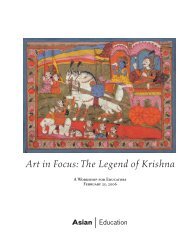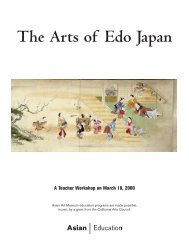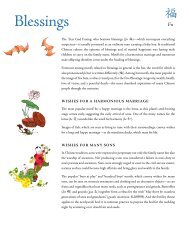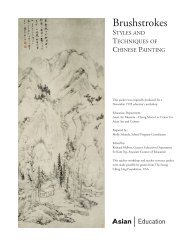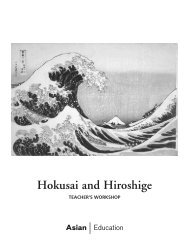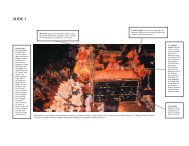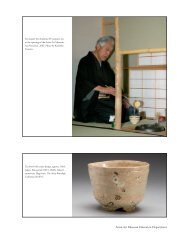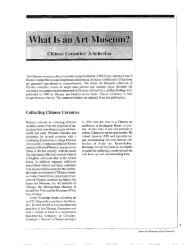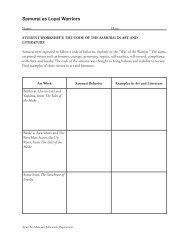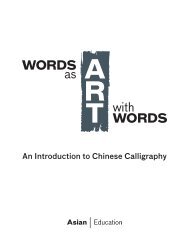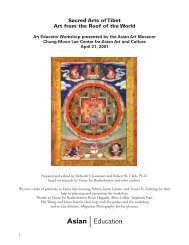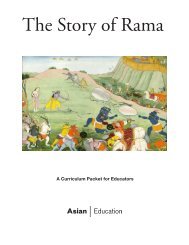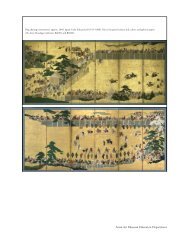China:The Glorious Tang And Song Dynasties - Asian Art Museum ...
China:The Glorious Tang And Song Dynasties - Asian Art Museum ...
China:The Glorious Tang And Song Dynasties - Asian Art Museum ...
Create successful ePaper yourself
Turn your PDF publications into a flip-book with our unique Google optimized e-Paper software.
Du Fu was born in Gongxian, close to the eastern <strong>Tang</strong> capital. His youth was spent in education<br />
for the civil service exams. Beginning around 735, he took the exam several times, but he failed<br />
repeatedly. Finally he gave up. He eventually became an official, but his political career was a failure.<br />
Instead, Du Fu devoted himself to poetry; he claimed never to be satisfied until the magic of his<br />
words struck his readers, leaving a lasting impression. He became a master craftsman of words, and<br />
few poets could equal his skill. Du Fu also had penetrating social insight. For instance, in the poems<br />
he wrote about the frontier, he unmasked hidden problems beneath the glory of victory—for example,<br />
the suffering of soldiers.<br />
On the Border, First Series (the Fourth)<br />
We recruits have our commanders to send us off,<br />
But, bound for distant duty, we’re people too!<br />
From here we go out to face life of death—<br />
No cause for the officers to scowl at us so!<br />
Along the route we come on someone we know,<br />
Give him a letter to hand to close kin.<br />
Sad as it is, we and they are parted now,<br />
No longer to share the same troubles and pain.<br />
Translated by Burton Watson<br />
This poem narrates the often miserable lives of recruits sent to frontiers to fight wars and face<br />
death. Despite their acceptance of dangerous duties they are abused by commanders. Separated<br />
from family and friends they are lonely and homesick. <strong>The</strong>ir cold comfort is to send letters home<br />
with acquaintances they meet by chance along a road.<br />
C. <strong>The</strong> appeal of the exotic: “<strong>The</strong> Girl Who Danced the Whirl” by Bai Juyi<br />
<strong>The</strong> culture of the <strong>Tang</strong> was truly cosmopolitan. <strong>Tang</strong> society confidently explored all things new<br />
and foreign. Persians, Indians, Syrians, and people from all over Asia arrived daily into Chang’an,<br />
the <strong>Tang</strong> capital. <strong>Tang</strong> people actively sought out foreign lands for cultural and economic exchanges,<br />
and they welcomed foreign fashions, amusements, products, and immigrant peoples. For instance,<br />
the game of polo, originally a foreign amusement, gained wide popularity among the elite; the<br />
Whirl, originally a foreign dance, became the favorite entertainment for the Chinese; and the image<br />
of Arabic or Persian camels and their non-Chinese grooms occurred everywhere in ceramic artifacts.<br />
All these exotic entities inspired the fascination of <strong>Tang</strong> poets. Descriptions of foreign customs,<br />
fashions, and entertainment became conspicuous themes in <strong>Tang</strong> poetry. One good example is “<strong>The</strong><br />
Girl Who Dances the Whirl” by Bai Juyi.<br />
Bai Juyi (772–846) was as famous as Li Bo and Du Fu. Born into a poor scholarly family at<br />
Xinzhen, Bai Juyi spent his youth in education for civil service exams. Compared to many other<br />
<strong>Tang</strong> poets, Bai Juyi had much greater luck in successful entry to the civil service. He passed the<br />
civil service exam when he was very young. He experienced dramatic ups and downs in his official<br />
19



